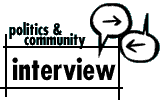
The Unschooled
The Interviews by William "Upski" Wimsatt with Unschoolers:

Most educators would consider me a school success story. After Sister
Fransella praised me in the first few days of kindergarten for being able
to differentiate between the words "meat" and "meet," I was hooked. From
that point on I relished the feeling of achievement that comes with having
the right answer, being the first to raise your hand, and, of course,
receiving good grades. I didn't work hard -- I just became adept at giving
teachers exactly what they wanted. This pattern continued throughout
grammar school, high school, and well into college.
Throughout my academic career, I wasn't aware that praise and recognition
was my main motivation for doing well. I've only recently begun to
understand that. But even in the early years of schooling I observed that
as I continued to excel, many friends and classmates fell by the wayside,
resigned to never breaking into the A-B grade range. While I knew that many
of these "school casualties" were intelligent people, I was too busy making
the honor roll and basking in middle school glory to worry about them.
High school cemented the classifications of the previous eight years. I was
put into honors classes with other students like me. Most of my friends
were placed in the "average" classes, and a few were consigned to the "slow
learners" program. Through identification and separation, school continued
to etch into our minds that some people are good learners and some aren't
so good, and once your status is determined there's not much you can do
about it.
And so we continued on. A few of us attended "prestigious" colleges, others
went to "decent" colleges and universities, and some didn't go to school at
all. We could have predicted that it would turn out that way. After twelve
years we had been conditioned to see our paths as foregone conclusions,
necessary outcomes of the education process. None of us thought to stop and
ask: "Why does school have the authority to judge intellectual talent? Have
we really learned anything, or have we merely been educated?"
That's why I'm so excited to present these interviews on
unschooling. As politicians and experts argue over teachers unions and
voucher systems, no one is questioning the assumption that compulsory
schooling helps students learn. I hope the following ideas will, at least
for a moment, make you doubt the value of "education" as it is
traditionally defined. I realize that unschooling is not the right thing
for everyone -- most of us are finished with school anyway. But by
questioning the motivations behind state-regulated, mandatory education,
perhaps we all can learn something for a change.
-- Anthony Qaiyum
